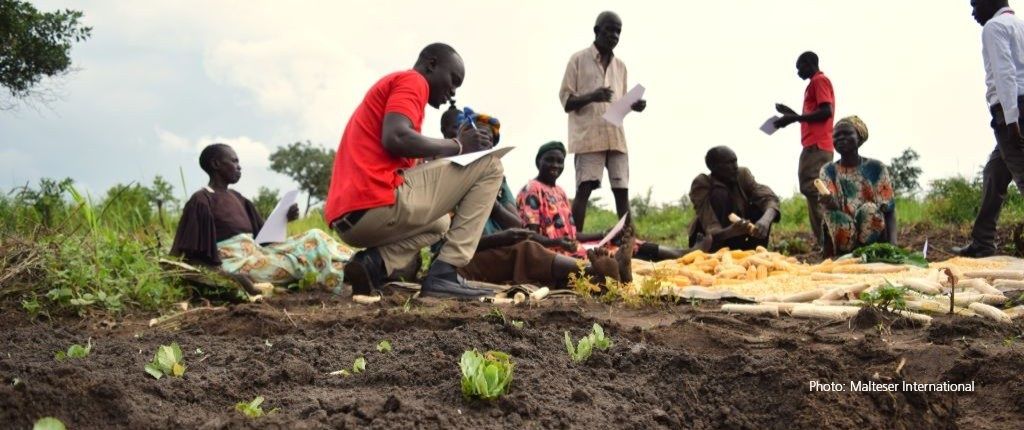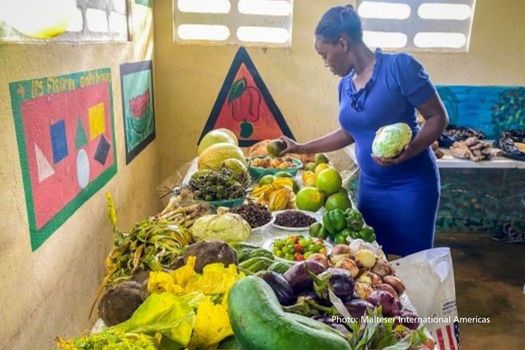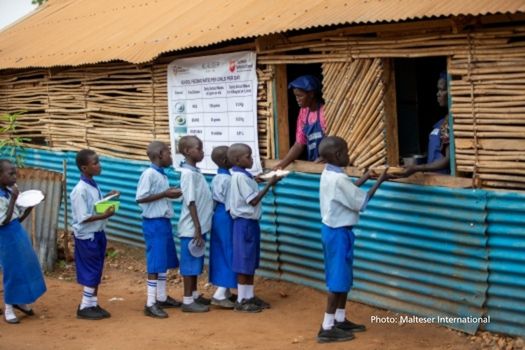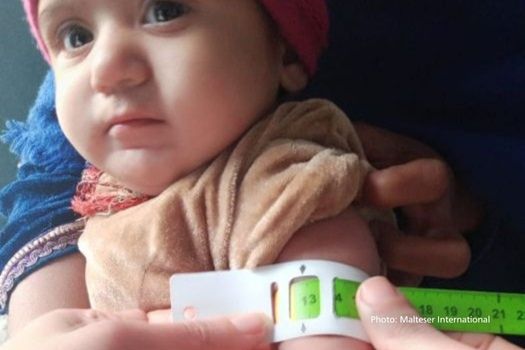
Food and Nutrition Security are Essential for Good Health
At Malteser International, we aim to support a life in health and dignity for people in need - this includes healthy and nutritious food, both in crises and after disasters. How, though, do we even know what that means for different people in different places, cultures, climate zones around the world? For one, we have experts on Food and Nutrition Security (FNS) in our teams on the ground. For another, we have Jennifer Arlt, who is our Global Food and Nutrition Security and Program Advisor. In this interview, she talks about her job, the connection between health and FNS, and our most important FNS measures. Together with her colleagues, Jennifer ensures that our work is needs-based and sustainably effective.

Hello Jennifer, please tell us: What is your job at Malteser International and what do you do there?
Jennifer Arlt: I work for Malteser International as a Program Advisor for Food and Nutrition Security (FNS). My advisory work covers everything “from farm to fork”, that means I provide technical advice to our project managers in areas ranging from initial relief in humanitarian crises to strengthening resilience. This includes measures such as the distribution of seeds, food aid, or the detection and management of acute malnutrition.
What role does Food and Nutrition Security play in Malteser International's core area of work, health?
Jennifer Arlt: At Malteser International, we understand health to be more than just the absence of illness. For us, health means that people can live well physically, mentally, and socially. That is why we look beyond the traditional scope of healthcare.
An important building block for this is Food and Nutrition Security (FNS). Those who can eat adequately and in a balanced way fall ill less often and, in the event of illness, have better chances of recovery. Clean water, good hygiene, and safe sanitation facilities also play a central role in health.
Our projects therefore combine measures from different areas: health, FNS, and WASH (water, sanitation, and hygiene). In this way, we strengthen health prevention and help people recover better from illness – whether in basic healthcare, emergency response, or in building resilience. Resilience means the ability of people, communities, or systems to recover after a crisis, adapt to new circumstances, and become stronger and more resistant to crises in the long term.
A particularly important aspect for us is the so-called One Health approach. It considers the health of people, animals, and the environment together – because everything is interconnected. By taking these connections into account, we can provide more sustainable support and use resources more efficiently.

What is Malteser International currently doing in Food and Nutrition Security?
Jennifer Arlt: Food and Nutrition Security (FNS) is a multifaceted field – and no two projects are alike. Before we act, we analyze exactly what the local people really need. This is the only way we can provide targeted help.
At the moment, food-sensitive agricultural projects make up most of our projects. This means that we promote environmentally friendly farming methods that not only protect nature but also improve people's nutrition. The aim is to make diets more varied and healthier – for example, to prevent deficiency symptoms such as iron or vitamin deficiency.
Other projects focus more on treating acute malnutrition, especially in young children and their parents. In crisis areas, many families have gone through difficult times or are still in the midst of them. Here, we provide support in the form of nutritional therapy, medical care, and psychosocial assistance. After all, a child's healthy development requires more than just food – security, affection, and stability also play a major role.
You travel a lot for your work. Why?
Jennifer Arlt: Malteser International employs qualified local staff in its project areas who carry out their work independently and conscientiously. They are deeply familiar with the living conditions of the communities and understand which factors can improve or worsen the food and nutrition security situation.
If there are technical questions about the planning, implementation, or evaluation of projects, I support our teams – and I can do this best if I see and experience the local situation myself. On my last trips, I worked with my colleagues on how they can better integrate their observations and measurements into everyday project work. This allows progress to be recorded in a targeted manner – and new projects can build on what has already been achieved.
When developing follow-up projects or new ideas, it is particularly helpful to have someone from outside the organization take a fresh look at them. This is how we create solutions together that meet people's needs.

In the event of a sudden-onset disaster such as an earthquake, what is important to prevent malnutrition?
Jennifer Arlt: That's a very good question. When a disaster such as an earthquake strikes suddenly, swift action is crucial to prevent malnutrition. Pregnant women, nursing mothers, and young children are particularly at risk. The first 1,000 days – from pregnancy to the second birthday – are a sensitive window of opportunity that determines whether a child will grow up healthy and develop well. That is why these groups are the focus of our aid efforts.
In addition to nutrition, psychosocial support is important. In such exceptional situations, parents need help and guidance so that they can provide for their children and give them a sense of security. Breastfeeding support and nutrition appropriate for young children are at the top of the list – because they are crucial to ensuring that the next generation has the best possible start in life despite the crisis.
Another important question is: Are local markets still functioning? If so, we can provide cash or voucher assistance to ensure that families can feed themselves. This also boosts the local economy and supports reconstruction. However, if markets have collapsed, we deliver food directly to ensure supplies.
In your opinion, what must the international community do to still achieve the UN's “Zero Hunger 2030” goal?
Jennifer Arlt: The world produces enough food for everyone. Yet hunger still exists due to unequal distribution, lack of access, and high prices. The current SOFI 2025 report shows that progress is unevenly distributed: while hunger is declining in some regions, it is increasing in Africa and West Asia. To still achieve the UN's “Zero Hunger” goal by 2030, decisive action is needed for fair distribution, strong social protection systems, investment in sustainable agriculture and markets, as well as political will and international cooperation.
(September 2025)








